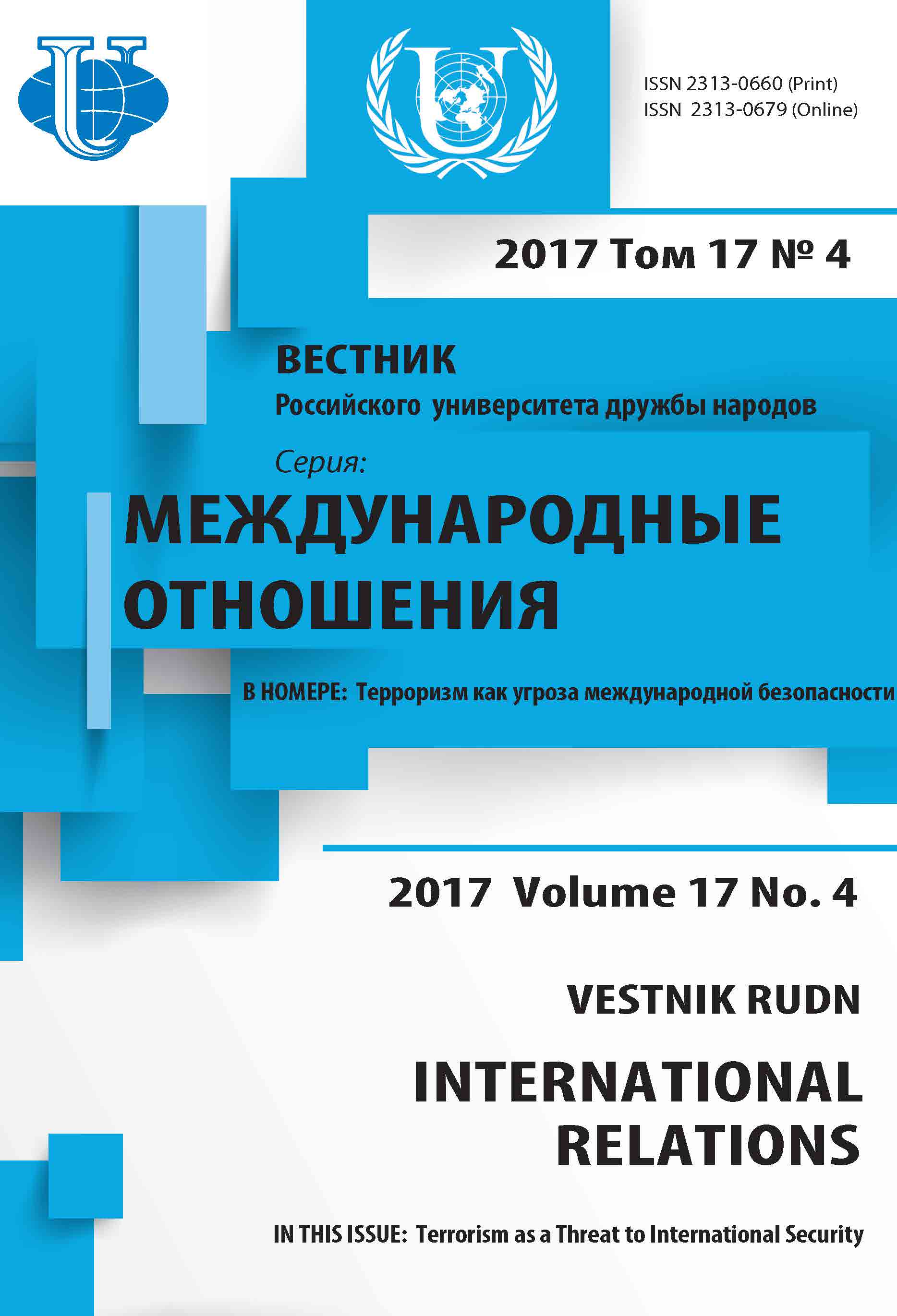SOVIET^AMERICAN CONTRADICTIONS REGARDING KOREA (1944-1945)
- Authors: Minkova KV1
-
Affiliations:
- Saint Petersburg State University
- Issue: Vol 17, No 4 (2017): Terrorism as a threat to international security
- Pages: 839-856
- Section: HISTORY OF INTERNATIONAL RELATIONS
- URL: https://journals.rudn.ru/international-relations/article/view/17540
- DOI: https://doi.org/10.22363/2313-0660-2017-17-4-839-856
Cite item
Full Text
Abstract
The article examines the place of the Korean problem in Soviet-American relations of the first post-war years. It reveals the foundations of Soviet and American policy towards the “Korean ques-tion” and introduces two new actors that operated on the U.S. territory and played a significant role in shaping this policy. Stemming from principles of historicism and scientific objectivity, having carefully analyzed Soviet documents and compared them with those of the U.S., the author concludes that before the beginning of 1950, the Korean question has not been a top priority issue neither for Moscow nor for Washington. Both sides advocated the creation of an independent Korea (albeit with different goals and in their own unique un-derstanding of “independence”). At the same time, at the end of 1945, the Korean question became one of the issues that prevented the Yalta agreements becoming a reality. Like a number of other issues that were considered at the same time and did not receive the expected and rapid solution, the Korean problem was no longer perceived by the Allies as an autonomous one. The emergence of mutual misunderstanding and suspicion between the USSR and the United States was partly promoted by the actions of the future irst president of South Korea, Syngman Rhee, who sought to increase his political capital through ex-citing enmity between the Soviet Union and the United States. A certain role in them was played also by the head of the Sino-Korean People’s League Kilsoo Haan. The change in Soviet policy towards Korea, which became one of the main reasons for the outbreak of the Korean War, occurred only in the early 1950 and was the result of a dramatic change in the political situation in the world, which differed dramatically from that of the Yalta agreements.
About the authors
K V Minkova
Saint Petersburg State University
Author for correspondence.
Email: kristina_minkova@mail.ru
Minkova Kristina Vladimirovna - PhD in History, Senior Lecturer of the Department of American Studies of the Faculty of International Relations of Saint Petersburg State University
References
- Borton, H. (2002). Spanning Japan’s Modern Security: the Memoirs of Hugh Borton. N.Y.: Lexington.
- Byrnes, J.F. (1947). Speaking Frankly. N.Y.: Harper & Brothers. Cumings, B. (1981). The Origins of the Korean War: In 2 Volumes. I. Princeton: Princeton University Press.
- Dallin, D. (1961). Soviet Foreign Policy After Stalin. Philadelphia: J.B. Lippincott.
- Kim, R.S. (2009). American Diplomacy and Strategy toward Korea and Northeast Asia, 1882—1950 and After: Perception of Polarity and US Commitment to a Periphery. N.Y.: Palgrave McMillan.
- Kim, R.S. (2011). The Quest for Statehood: Korean Immigrant Nationalism and U.S. Sovereignty, 1905—1945. Oxford: Oxford University Press. Korean question and the American Forces in the Southern Korea. (2003). Pyongyang. (in Russ.).
- Koshkin, А.А. (2004). Stalin’s Japanese Front. Facts. Documents. Мoscow: Olma-Press. (in Russ.).
- Koshkin, А.А. (2010). Russia and Japan: Knots of Contradictions. Мoscow: Veche. (in Russ.).
- Sadakov, D.A. (2016). Korea, 1945—1948. Decisions of the USA and USSR in the Process of Constructing the Future of the Peninsula as the Triggers of Break-up. Herald of Vyatka State University for the Humanities, 9, 33—45. (in Russ.).
- Shabshina, F.I. (1958). Essays on the Contemporary History of Korea, 1945—1953. Moscow: Gospolitzidat. (in Russ.).
- Shulman, M. (1963). Stalin’s Foreign Policy Reappraised. Cambridge. Mass.: Harvard University Press.
- Slavinskii, B.N. (2004). The Japanese-Soviet Neutrality Pact, 1941—1945. London, N.Y: Routledge.
- Stettinius, E.R. Jr. (1949). Roosevelt and the Russians. Garden City, N.Y.: Doubleday and Company.
- Taylor, P.H. (1948). Military Government Experience in Korea. In: ed. American Experiences in Military Government in World War II. Ed. by Friedrich et al. N.Y.: Rinehart, p. 355—377.
- Togo, S. (1996). Memoirs of a Japanese Diplomat. Moscow: Novina. (in Russ.).
- Ulam, A. (1992). The Communists: The Story of Power and Lost Illusions: 1948—1991. New York and Toronto: Charles Scribner’s Sons. Weathersby, K. (1993). Soviet Aims in Korea and the Origins of the Korean War, 1945—1950: New Evidence from Russian Archives. Paper prepared of the Woodrow Wilson International Center for Scholars.
- Washington, D.C. Welles, S. (1950). Seven decisions that shaped History. N.Y.: Harper & Row.











